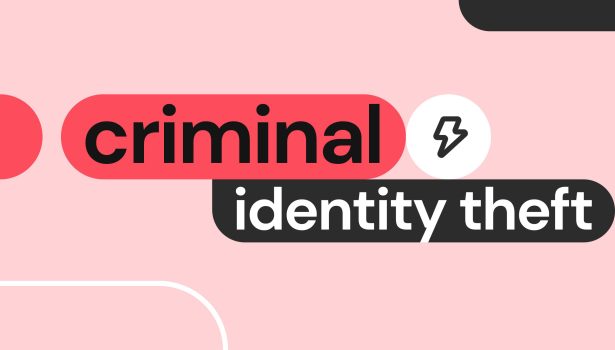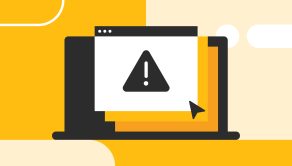What is criminal identity theft? Tips to secure your identity

Did you know that victims of identity theft can get arrested for crimes they didn’t commit? Here’s what you can do to protect yourself.
Criminal identity theft occurs when someone uses another person’s ID card or identifying information while being arrested. This results in criminal records being attributed to the victim of identity theft instead of the actual criminal. Signs of criminal identity theft include unfamiliar charges on credit reports, receiving unfamiliar bills or notices for debts, and notifications of arrests or legal actions involving activities the individual didn’t commit.
What is criminal identity theft?
Criminal identity theft is a uniquely damaging form of identity fraud. Criminal identity thieves present themselves as you whenever they’re arrested or cited for a crime. This is done by using your name, date of birth, Social Security number, debit cards, or other types of sensitive information.
Who is at risk of criminal identity theft?
Generally speaking, everyone is at risk of criminal identity theft because we all have identity verification numbers and cards that can be stolen, compromised, and misused. However, some factors put you at an elevated risk.
Chief among them is your online presence. In our Internet-centered age, a lot of crimes begin with Internet searches. A favorite resource for fraudsters is people-search sites. These sites compile all sorts of sensitive information about you and your family — and sell it to anyone who’s willing to pay.

If your information shows up on any of the hundreds of people-search sites currently active (it probably does), then you have a target on your back. You can stop identity theft by getting off the criminal’s shortlist and following the tips we set out in this guide.
What are the consequences of criminal identity theft?
If someone is caught for a crime and gives law enforcement your information, it could tarnish your name and go unnoticed for years. Here are some common penalties that criminal identity theft victims experience:
- Fines and jail time: According to the Identity Theft Resource Center (ITRC), identity thieves often use stolen IDs to evade traffic or misdemeanor violations. Once the perpetrator doesn’t show up in court, you’re the one who will get issued the fines, an arrest warrant, and even criminal charges.
- Criminal records: So many important steps in life require a background check. Whether you’re about to fill out a college application, want to adopt a child, or so much more, fraudulent criminal records could be a major hurdle.
- Loss of a current or potential job: If you’re wrongly tied to white-collar crimes, sex crimes, violent crimes, or any other illegal activity, you could be out of a job once your employer finds out. This can also make it very difficult to get a new job since employers will see your criminal record.
- Further crimes: Of course, if a thief already has enough personal information to impersonate you, they will likely try to commit other crimes concerning your finances like credit card fraud. They may also sell your information on the dark web.
How does criminal identity theft occur?
Though criminal identity theft isn’t as common as some other types of identity theft, it can entirely upend your life. Here are some of the most common ways fraudsters commit criminal identity theft:
- Stealing your license or SSN: By stealing your SSN or driver’s license and presenting it to law enforcement upon arrest or investigation, criminals can evade legal repercussions – leaving you with the consequences of their actions.
- Stealing online information: Many people think that just because they keep their social media profiles private their personally identifiable information isn’t easy to locate online. This is entirely false. People-search sites collect highly sensitive information on individuals and publish it for the world to see. Your identity might just be a few clicks away for any thief who cares to look for it. To protect you from the risks associated with sensitive information exposure, we made Onerep, a privacy tool that scrubs your personal details off of 230 people-search sites.
Signs that you’re a victim of criminal identity theft
Criminal identity theft can be very difficult to detect. Here are some signs that you should look out for:
- Lost ID or SSN: Losing personal identification is a very serious problem. If you’ve lost your driver’s license or Social Security card, immediately file a police report to prevent it from being misused. Next, file a report at the Department of Motor Vehicles (DMV) concerning your lost license.
- Legal notices: If you get notices of mysterious court appearance dates, legal fines, or involvement in illegal activities, it could be criminal identity theft.
- Marks on your credit report: If you see mysterious derogatory marks or new lines of credit open on your annual credit report, that’s a big red flag of criminal activity.
- Rejected checks: If merchants are refusing your checks, an identity thief may be using your name to gain credit for more lucrative financial or criminal acts. This means the unpaid bills they rack up are yours to deal with.
How do I fix criminal identity theft?
If you have reason to believe that your identity has been stolen, act immediately. Here are some actionable steps to take:
- Contact companies where fraud occurred: The FTC recommends getting information from the companies where the fraud took place, and then asking them to close or freeze your accounts until this all blows over.

- Place a fraud alert at a credit bureau: Every year, you get one free fraud alert option. You can contact any of the three major credit reporting agencies to enable the alert. That bureau will then notify the other two. This alert requires all businesses to verify your identity before opening up a new line of credit in your name.
- Immediately file a report: If you know you’re a victim of identity theft, immediately file a report with the following entities
1. Report to the Federal Trade Commission
2. Report to the Federal Bureau of Investigation’s IC3
3. Report to major credit bureaus and law enforcement agencies - Change all login information: Update the passwords to your most important online accounts. Make sure these are strong passwords, such as randomized alpha-numeric strings.
- Clear your name: Once you’ve secured your identity, it’s time to clean up the damages. Start by closing new accounts wrongfully opened in your name. Next, begin removing fraudulent charges from your accounts. Then, review your credit report and send a letter to the credit bureaus regarding corrections. You can use the FTC’s sample letter template.
- Look for new unusual activity: Regularly monitor your bank statements, credit score, and other relevant reports to make sure there’s no suspicious activity that could signal that criminals are still using your identity.
- Secure your personally identifiable information: This ranges from your full legal name and date of birth to credit cards, medical records, and driver’s license – keep private any detail that others could use to present themselves as you.
- Consider getting identity theft insurance: An identity theft insurance company will help you monitor your credit and financial accounts, alert you of suspicious activity, and cover the costs associated with the recovery process.
To wrap it up…
The only thing scarier than finding out that a criminal can access your bank account is getting arrested for a crime you didn’t commit. Our team is here to prevent that – our tool will automatically remove your sensitive details before thieves have a chance to find them. Onerep is offering a free 5-day trial to anyone who wants to start protecting their personally identifiable information online.
FAQ
Is criminal identity theft common?
While it’s not the most common type of identity theft, criminal ID theft can have a life-changing effect on victims.
How can a victim of a criminal identity theft clear their name?
Clearing your name starts with reporting the crime to the police department in the jurisdiction where the crime occurred or, with your local police department. When this is done you can deal with fraudulent entries with affected businesses and agencies. For that, you’ll need to request a copy of your police report and a letter of clearance to supply to the entities where your name needs to be cleared. You may also need to petition the court to expunge the wrongfully attributed criminal record and contact the DMV if your identity theft occurred through using your driver’s license.





Mark comes from a strong background in the identity theft protection and consumer credit world, having spent 4 years at Experian, including working on FreeCreditReport and ProtectMyID. He is frequently featured on various media outlets, including MarketWatch, Yahoo News, WTVC, CBS News, and others.